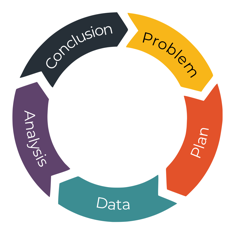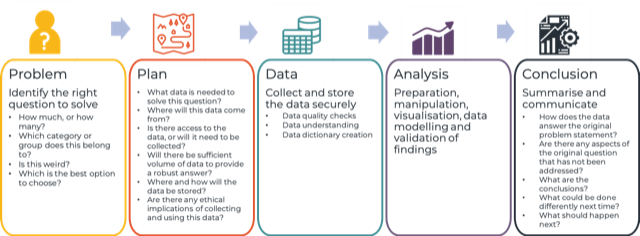The underlying goal of this project and the curriculum framework it has developed is to teach learners how to use data ethically to solve real-world problems. The figure below shows PPDAC – the data problem-solving cycle [1], also known as Problem, Plan, Data, Analysis and Conclusion.

This is a well-established approach to statistical literacy which is relevant to how we teach data literacy after the transformational change “big data” has had on society. PPDAC was designed to document the stages a person would undertake when solving a problem using numerical evidence, normally using data which they had collected themselves. We have broadened it to apply to situations where learners use existing public data sets rather than collecting their own, where data might be automatically collected by sensors, and where analysis methods can include machine learning algorithms as well as more traditional statistical techniques calculated by a person.
[1] Adapted from Wolff, A., Gooch, D., Montaner, C., Rashid, J. J., Kortuem, U., Wolff, A., … Kortuem, G. (2016). Creating an Understanding of Data Literacy for a Data-driven Society. The Journal of Community Informatics, 12(3), 9–26. Retrieved from www.ci-journal.net/index.php/ciej/article/view/1286.

The real-world problem-solving context
The purpose of teaching data literacy is to develop skills so that learners can use data to understand the world and use it to inform their decision making in everyday problems. Learners should work with data sets gathered in the real world where possible. They should have opportunities to:
- Collect new data through surveys in the school or local community (e.g. surveys of how pupils travel to school);
- Process and explore data gathered through sensors in the local environment (e.g. temperature or humidity sensors in the playground);
- Find, explore and analyse data sets relating to their personal interests (e.g. movies or trading cards)
- Explore and analyse existing public data sets published by governments, international organisations and researchers (e.g. World Health Organisation or Gapminder);
- Contribute to open-source data sets or take part in citizen science projects to analyse data (e.g. Galaxy Zoo).
- Share datasets with other schools, community groups and scientific teams to be part of a wider research project (e.g. gathering and sharing data from national projects to document insect, flowers or birds across the country).
Read more about each stage of PPDAC -The Data Problem Solving Cycle



